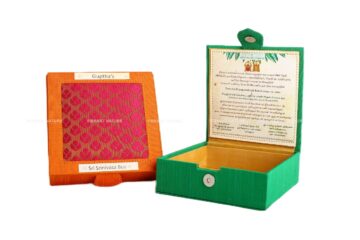Weddings in South India are colourful, joyous affairs celebrated with great pomp and religious fervour. Rooted in rich cultural traditions, these weddings are a harmonious blend of ancient rituals and modern elements. At the heart of these auspicious ceremonies stands the reverend priest, a pivotal figure responsible for conducting the rituals and ensuring that the sacred union between two souls is blessed by the divine. In this blog, we delve into the essential role of the priest and the profound significance he holds in South Indian weddings.
The Priest: An Embodiment of Tradition and Knowledge
The priest, often known as the “Purohit” or “Brahmin,” plays a crucial role in South Indian weddings. They are considered the torchbearers of ancient traditions and are highly respected in society for their deep knowledge of religious scriptures and rituals. Traditionally, these priests come from families that have upheld the sacred duties for generations, passing down their wisdom and expertise from one generation to the next.
Gurubyonamaha is our Sanadhan Dharma. Matha Pitha Guru Deivam The priest is our guru during the wedding ceremony.
- Every family will have a Family Priest (Kula Guru). Balam jasthi for them. They know the family gothram and nakshatram of all family members. If it’s going to be a non-family priest for the wedding, give the family’s gothram and nakshatram details on paper first, which will be helpful during sangalpam.
- Based on the Bride and groom’s horoscope, fix a date with the priest.
- Pooja items are sometimes brought by the priest or by us.
- Family tradition keeps changing in different families. If the priest and family plan well ahead, the wedding will go smoothly.
- When a priest recites the Vedha Manthiram, the hall should be kept in silence.
- To keep muhurtham on time, priest help is very important. For example, saree changing time is a big factor in all wedding muhurthams. If we discuss and fix a time with the priest (minutes planning), we will have an easy muhurtham with no tension.
- Strictly educate everyone not to wear slippers when entering the mandapam where pooja happens.
- Keep a family member as an assistant for the priest to help in all required ways.
- Priestly dhanam is very important. Find the number of priests and plan accordingly.
The following are their responsibilities
- Matching Horoscopes: The priest begins his involvement even before the wedding preparations commence. They carefully match the horoscopes of the bride and groom, seeking auspicious planetary alignments and ensuring compatibility for a harmonious life together.
- Fixing the Wedding Date: Based on astrological calculations and auspicious timings, the priest selects the perfect date and time for the wedding, ensuring it is in harmony with the celestial bodies.
- Conducting Rituals: On the day of the wedding, the priest is at centre stage, conducting various sacred rituals. From the Ganesh Puja, which seeks blessings from Lord Ganesha, to the Saptapadi, the seven vows taken around the holy fire (Agni), every ritual is carefully performed as per ancient scriptures.
- Invoking the Blessings: The priest channels the blessings of the divine during the ceremonies. Their powerful chants and invocations seek the blessings of the gods and ancestors, creating an aura of sanctity and spirituality.
Interpretation and Guidance: The priest also plays the role of an interpreter, explaining the significance of each ritual and its meaning to the couple and attendees. This helps foster a deeper understanding and appreciation for the traditions.
Significance of Priest in South Indian Weddings:
- Preserving Traditions: The priest’s presence and involvement ensure that age-old customs and rituals are meticulously preserved and passed on to future generations. This continuity of tradition strengthens the cultural fabric of South Indian society.
- Spiritual Sanctity: South Indian weddings are not just social events but deeply spiritual occasions. The priest’s involvement infuses the ceremony with divine blessings, creating an atmosphere of sacredness and spirituality.
- Guidance and Blessings: The priest provides guidance and blessings to the couple, bestowing upon them the wisdom needed to navigate the journey of married life with love, respect, and understanding.
- Community Cohesion: Weddings in South India are community affairs, and the priest serves as a unifying figure, bringing together family, friends, and well-wishers in celebration of love and union.
- Symbol of Wisdom: The priest’s knowledge of the sacred texts and rituals represents the wisdom of ancient sages and scribes. Their presence evokes a sense of reverence and admiration for the wisdom of the past.
In South Indian weddings, the role of the priest is multifaceted, embodying tradition, spirituality, and knowledge. They stand as custodians of the sacred rituals, guiding couples into a new phase of life with divine blessings and profound wisdom. The presence of the priest in these joyous celebrations not only strengthens the cultural roots of South India but also enriches the wedding experience with spiritual sanctity and a sense of profound meaning.




